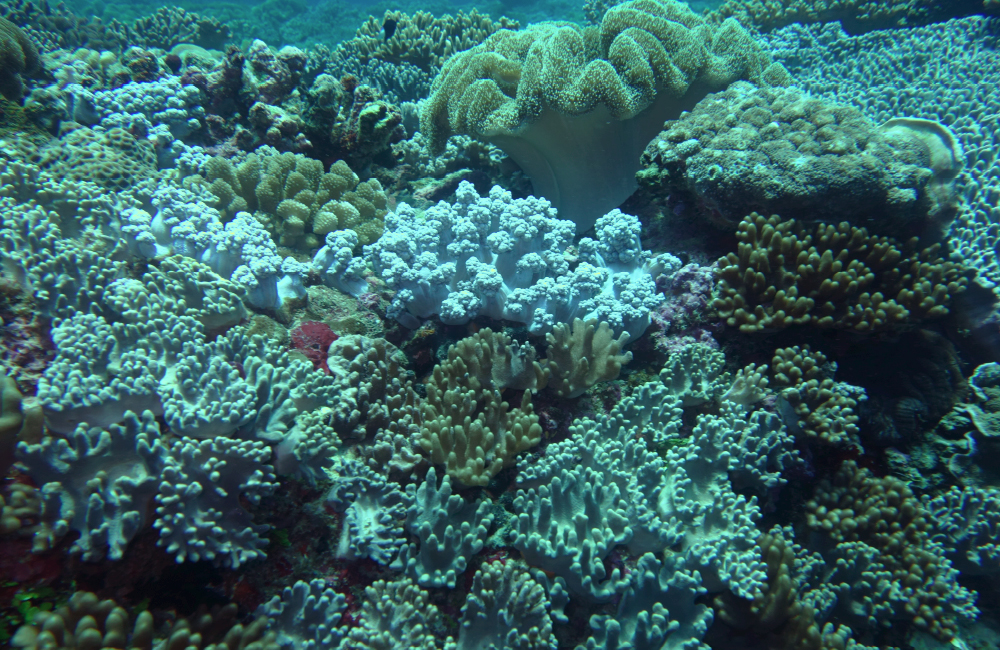NSF Supports Coral Reef Research
August 13, 2019
Like an undersea version of the canary in a coal mine analogy, soft corals are indicator species whose vibrancy and health act as a gauge for the overall habitat of a coral reef. Coral reefs provide food, livelihoods and coastal protection for more than 500 million people worldwide and are among the ecosystems most threatened by climate change, with some studies predicting that coral reefs may not survive into the next century.
“Most of the attention that’s been paid to coral reefs has been on stony corals, the reef builders,” says Harvey Mudd College biology professor Catherine McFadden. “I work on the soft corals, which are often 50% or more of what’s living on the reefs and really important as habitat for other organisms. They are being affected by the same climate change events as the stony corals, but little is understood about these impacts on the soft corals because we don’t know how many species there are or how to tell them apart.”
This lack of basic information is due in large part to the difficulty of distinguishing and correctly identifying octocoral species, coupled with a dearth of easily accessible resources to facilitate their identification. To address the issue, the National Science Foundation (NSF) has awarded Harvey Mudd College an $839,060 grant to support research by biology professor Catherine McFadden, HMC postdoctoral researcher Andrea Quattrini and their colleague Tel Aviv University biology professor Yehuda Benayahu.
This project, “RUI: NSF-BSF: PurSUiT: The Indo-Pacific zooxanthellate octocorals: An integrated approach to species delimitation, phylogenetics and biogeography,” has three objectives: Combine molecular genetic analyses with high-resolution microscopy to discriminate species of soft corals collected from throughout the Indo-Pacific; examine and re-describe historical specimens housed in major museum collections to facilitate the correct assignment of names to those species; and compile the information within a publicly accessible web portal that will allow users worldwide to generate species checklists and interactive keys for identifying reef-dwelling soft corals.
“A lot of recent surveys have been done, but much of the material that has been collected is sitting unidentified in museums around the world,” McFadden says. Museum collections McFadden intends to research are housed in California, Florida, the Netherlands, Australia and Tel Aviv.
In October, Quattrini will join the staff at the Smithsonian National Museum of Natural History, home to the world’s largest collection of coral specimens. The grant will support her work at the Smithsonian as well as provide opportunities for HMC students to join her for summer research.
During her time at Harvey Mudd, Quattrini’s work was focused on developing the target- enrichment technique for genomic sequencing of soft coral species that researchers will employ for this project. “Other people have used this technique in birds and spiders and some invertebrates, but we’re the first to develop this for corals and their relatives, the anemones,” Quattrini says. As part of the project, Quattrini and McFadden will host a workshop to teach the technique to an international group of researchers.
Over four years, the project will support three summer research positions annually (including one position earmarked for a graduate of the College’s Upward Bound program) and additional student positions during each academic year.
The College will also benefit from a related NSF grant to the University of Florida, which distributed a subaward to McFadden for collaboration on a large-scale biodiversity survey of the coast of Oman. The subaward will fund one summer research position at HMC annually for three years.
NSF grants are the largest share of external support for HMC faculty research.
